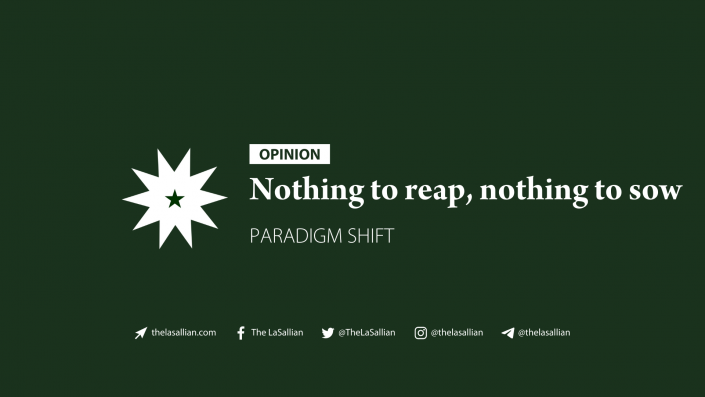
“Hampaslupa” is a Filipino word literally meaning “to strike the land”. We often see how this phrase is used as a derogatory term for people who are dirt-poor. However, this is a far cry from its original purpose of describing farmers, people who make a living out of striking the land and tilling it for crops. Seeing a word like this lose its meaning shows just how our country has lost the meaning of agriculture.
I grew up among the sugarcane stalks of our family farm. Every morning, sacadas would pass by our house on the way to the fields, armed with their bolos and makeshift coverings to protect them from the heat. As a child, I never understood why people willingly chose to work for hours and hours on end under the scorching sun just to plant and to harvest these crops.
This childhood would sound idyllic to most—getting to ride carabaos, bathing in the river, and having an endless supply of sugarcane to chew on during hot afternoons. But the sweetness of the canes could never mask the harsh realities of farming. Because crops like sugarcane took so long to grow, there would be a time in the year where there was no harvest and no income. They called it “tiempos muertos” to describe how the farmers basically ran on fumes and stretched every bit of the wages they had collected as they waited for the harvest.
There’s nothing easy about about farming, or agriculture in general. The agrarian struggles I have witnessed here in my home island of Negros are just the tip of the iceberg when it comes to the state of agriculture in our country. On paper, it should be relatively simple to see the Philippines as a powerhouse with the variety of crops produced and availability of land for growing them. However, factors like climate change, underpaid workers, failed agrarian reforms, an the perpetuated feudal system have currently doomed our potential. Agriculture is the lifeline of the country; however, it seems to be that we can’t even sustain our farmers, let alone our farms.
According to a 2016 profile of the Filipino farmer, their average age is 56 years old. Whether this encompasses land owners or laborers, it’s a tell-tale sign that there is an alarming need for more young people to get into farming. The dying interest in agriculture can be attributed to many things, such as the interest in more commercial and technological lines of work. However, I have also seen and experienced myself that many farmers nowadays show no interest in passing on this responsibility and hardship to their children.
Steep competition from imported goods driven by low tariffs has also threated local producers. Just last July 14, the United States Department of Agriculture reported that the Philippines’ rice imports could breach the three-million ton mark by 2024. This is mainly attributed to the high demand for imported rice, particularly from Vietnam, for its lower price and higher quality compared to locally produced rice. It’s ominous that a country known for its strong roots in agriculture has now favored and become reliant on crops imported from other countries. In the end, the people who face the greatest impact from this shift are the smaller, local farmers.
The Department of Agriculture (DA) is one of, if not the, highest body of authority regarding the implementation of agrarian relief and systems of support. As it stands, President Ferdinand Marcos Jr. currently holds the position of the department’s secretary. Even Marcos Jr. himself understands that this role is temporary. He even acknowledges the urgency caused by rising food costs and looks to relaunch several projects from past administrations to address this—including his own father’s. However, many people see this as an act of uncertainty, placing both the DA and the future of Philippine agriculture in limbo.
There is still so much we can still do for our farmers, going beyond spreading awareness and buying local produce. We, as citizens, must pressure the government to appoint a secretary who is able to implement new systems to change the course of these issues and to restore the state of Philippine agriculture. As the old saying goes, we must be able to reap what we sow—but the seeds can’t be planted without proper guidance and decision-making, especially from our nation’s leaders. The future of the country depends on agriculture, and we deserve to have one that Filipinos are not only proud of but can also take part in.
